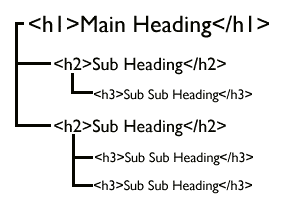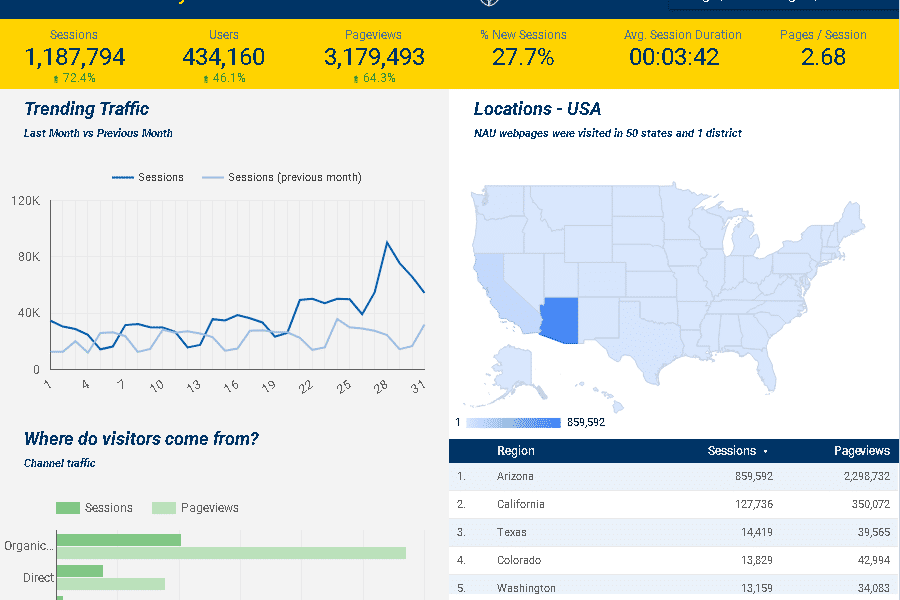Search engine optimization
Often referred to as SEO, search engine optimization is the collection of actions that can be performed to increase the relevance of a webpage so it appears higher on search engine results pages.
How do you write for SEO?
Optimizing content with keywords
ITS and Marketing will handle technical SEO efforts, but you can help with a focus on content. Remember that web readers (and search engines) read pages from left to right and from the top down, so your most important keywords should be in the first sentence. Read more about how to use the keyword list you’ll be provided with.
Basic keyword guidelines:
- Insert relevant keywords throughout your content where it doesn’t interrupt the integrity and natural flow of the sentence and paragraph
- Avoid keyword stuffing, or adding an unusual number of keywords to a page, which makes content difficult to read, and thus, provides a negative experience for the user
Visit our Web Writing Guidelines to learn more about writing for the web.
Heading structure and its value to your user and Google
How your headings are laid out is a very important aspect for SEO. Not only does a proper heading structure guide readers through the text, it is also a map for search engine bots that helps them grasp the main topic of the content.

Important heading standards to follow:
- Proper structure consists of H2 tags living under H1 tags, H3 tags living under H2 tags, and so forth…
- The page should only have one H1 tag and at least one H2 and H3 tag
- The H1 heading should be the main subject of the page, while the H2 heading is a brand-level phrase
- All heading tags should be inserted with your targeted keywords
- Do not use headings as a formatting tool
Google prioritizes unique headings
Users and search engines look for content specific to NAU. If titles and headings are too generic, the content appears less relevant. This causes your page to move down in search result page ranks.
Read more about writing effective headlines in the style guide.
Page title and meta description
Page title tag
In WordPress, you will find the title tag field below the content under Page SEO Settings and labeled Custom Page Title. This title is what appears as the link on search engine results pages and is important because it is the most visible text for your webpage. To craft a good page title, do the following:
- Keep it around 60 characters long
- Include your main keyword
- Include a branded term, such as “NAU”
- Make the title enticing
Meta description
The meta description field can be found right below the Custom Page Title field labeled Custom Page Description. The meta description should summarize the page’s content in one or two sentences with the goal of getting a user to click on your link. A well-written meta description should have these traits:
- Be about 210-260 characters in length
- Match the content on the page
- Have a call-to-action
- Include your main or secondary keyword
- It should be unique
Link building
Internal linking helps Google determine site structure and figure out which pages are related. Also, when linking to relevant, high-quality content, SEO value is passed to those pages. If possible, take advantage of opportunities to link from the current page to another page as long as it is relevant. For example, the CAL homepage might include a sentence such as “The College of Arts and Letters has 12 schools and programs, a highly recognized group of faculty and staff, and hosts dozens of fantastic events throughout the year.”
Image optimization
For best SEO results, image filenames should include one or two keywords. To learn more about naming your images, please consult our image naming standards guide. Images should also include alt tags or alt text, which describe what is on the image in relation to the content surrounding it. These alt tags should also incorporate one or two keywords. The most effective alt tags will be fairly long and descriptive in order to capture the keywords and action going on in the image.
University Marketing will actively support your SEO efforts by providing some keywords to get you started, as well as advice and ongoing guidance that you can solicit by sending an e-mail to University Marketing’s SEO team.
Web analytics
Automated reporting will be delivered to colleges and departments across the university. For any ad hoc or custom reporting requests, please reach out to the NAU digital marketing team.
